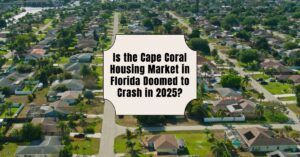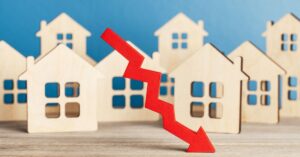The Florida sun, beautiful beaches, and promise of a relaxed lifestyle have long drawn people to Cape Coral. Homes were selling like hotcakes, and the city seemed destined for perpetual growth. But lately, a chill wind seems to be blowing through the Cape Coral real estate market. Could a crash be on the horizon, reminiscent of the devastating events of 2008? Let's delve into the data, dissect the trends, and see what 2025 might hold.
Why is Cape Coral Housing Market in Florida Doomed to Crash in 2025?
I remember vividly the aftermath of the 2008 crisis. As someone who's closely followed the real estate market for years, seeing families lose their homes and livelihoods was truly heartbreaking. Now, observing some similar patterns emerging in Cape Coral, I feel a sense of urgency to understand what's unfolding and share that knowledge.
A Deep Dive into Cape Coral's Real Estate Woes: Echoes of the Past?
To answer the question of whether Cape Coral is heading for a crash, we need to analyze the present and also glance in the rearview mirror. Are the ghosts of 2008 stirring? Let's see how things compare.
Cape Coral wasn’t just affected by the 2008 crisis; it was arguably ground zero for the housing bubble's burst. A confluence of factors created the perfect storm:
- Speculative Mania: Everyone was a “real estate expert”, buying homes as investments, fueled by the dream of flipping them for a quick profit. Many were naive.
- Subprime Lending Gone Wild: Banks handed out mortgages like candy without enough due diligence. Loans with adjustable rates and balloon payments were common, setting homeowners up for future shocks. People were offered money at every turn.
- Lack of Regulation and Oversight: The system failed to protect homeowners and the wider economy from predatory lending practices.
- Greed and Ignorance: Financial incentives drove reckless behavior at all levels, from mortgage brokers to Wall Street executives.
When the bubble finally burst, it sent shockwaves across the nation, and Cape Coral was among the hardest hit. Foreclosure rates skyrocketed, property values plummeted, and many families found themselves underwater on their mortgages. The scars of that crisis are still visible in some parts of the city.
Cape Coral's Housing Market in 2025: Déjà Vu?
Fast forward to today, and the trends in Cape Coral are raising some serious concerns. Here's a snapshot of the current situation:
- Plummeting Home Prices: According to multiple reports I'm seeing, the situation is precarious. Redfin stated that in May of 2025, Cape Coral home prices were down 7.7% compared to last year, selling for a median price of $361,000. That is not a good thing for sellers.
- Stagnant Sales: Buyers are hesitant. Redfin claims that there were 608 homes sold in May this year, down by 5.7% from 645 last year.
- Shift to a Buyer's Market: The upper hand has swung from sellers to buyers, empowering buyers to snag better deals.
- Surge in Time on Market: According to Redfin the normal transaction time has dramatically increased. Homes remain available for 76 days on average compared to 59 days from last year.
- Bottom Ranked: I came across a rather concerning report from Fox 4 Now, the news outlet ranked Cape Coral last among 123 midsize cities in the U.S. in their July 2025 hotness ratings chart.
To summarize, here's a table breaking down the important numbers:
| Key Metric | Value (May 2025) | Change from Previous Year | Source |
|---|---|---|---|
| Median Home Price | $361,000 | Down 7.7% | Redfin |
| Homes Sold | 608 | Down 5.7% | Redfin |
| Days on Market | 76 days | Up from 59 days | Redfin |
Decoding the Signs: Why is Cape Coral Facing This Pressure?
So, what's driving this downturn? A complex interplay of forces is at work:
- Falling Prices: A sustained decline in prices indicates a shift in the balance of supply and demand.
- Elevated Mortgage Rates: With interest rates hovering around 6.94% for a 30-year fixed mortgage currently, prospective buyers are getting priced out of the market. No one likes higher interest rates.
- Economic Cloudiness: Global uncertainties, inflation worries, and fears of a potential recession are making people cautious about big investments.
- Excess Inventory: Both new constructions and existing homes hitting the market after Hurricane Ian have resulted in a glut of supply.
- The Perils of Nature: Cape Coral’s vulnerability to hurricanes, floods, and rising sea levels increases insurance costs and could affect property resale values.
2008 vs. 2025: Parallels and Divergences
While some similarities exist between the current situation and the 2008 crisis, there are also important differences. The 2008 crisis was driven by subprime mortgages, speculative buying, and lax regulations, whereas now, high mortgage rates, economic uncertainty, and a supply glut are the primary drivers. Foreclosures are a risk, but the scale is way smaller than what we saw at the time.
Expert Insights and Predictions
What are the experts in the real estate world saying about Cape Coral?
- Quotes are pouring in that are concerning. Dr. Selma Hepp, Chief Economist at Cotality warns of “housing market headwinds”“. She identified that Cape Coral’s -6.5% year-over-year price decline in April 2025 stands out against the national growth of 2.0%.
- Realtors I have spoken to are advising that sellers be realistic.
What Buyers and Sellers in Cape Coral Should Be Doing Right Now
For the Savvy Buyer:
- This might be a prime opportunity to negotiate a better deal.
- Thoroughly investigate the property, including potential flood risks and insurance expenses.
- Take your time, and consult a local real estate attorney.
For the Strategic Seller:
- Adjust your price expectations to meet the market realities.
- Consider working with a local real estate agent who understands local conditions.
- Highlight what makes your property stands out.
The Bottom Line: Proceed with Informed Caution
Is Cape Coral guaranteed to crash? Not necessarily. However, there is a high chance of price decline. This is a time for informed caution and strategic decision-making. By understanding the market dynamics, seeking expert advice, and carefully assessing your risk tolerance, you can navigate the Cape Coral real estate landscape with greater confidence.
Invest in Real Estate in the “Hottest Florida Markets”
Discover high-quality, ready-to-rent properties designed to deliver consistent returns.
Contact Norada today to expand your real estate portfolio with confidence.
Contact our investment counselors (No Obligation):
(800) 611-3060
Read More:
- Will the Cape Coral Housing Market Repeat the Crash of 2008?
- Is Cape Coral the Next Florida Housing Market to Crash?
- 5 Popular Florida Housing Markets Are at High Risk of Price Crash
- 2 Florida Housing Markets Flagged for a Major Price Decline Risk
- 24 Florida Housing Markets Could See Home Prices Drop by Early 2026
- Is the Florida Housing Market Headed for Another Crash Like 2008?
- Key Trends Shaping the Florida Housing Market in 2025
- This Florida Housing Market Bucks National Trend With Declining Prices
- Florida Housing Market Crash 2.0? Analyst Warns of 2008 Echoes
- Tax Relief Proposed as Florida Housing Market Faces Deepening Crisis






